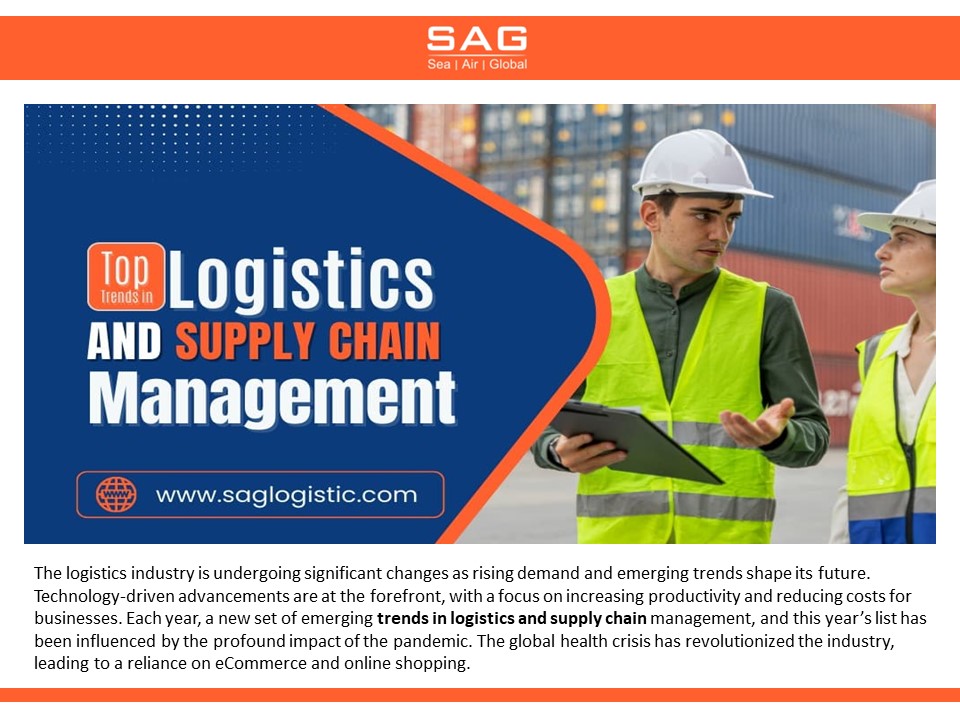Top Trends in Logistics and Supply Chain Management - PowerPoint PPT Presentation
Title:
Top Trends in Logistics and Supply Chain Management
Description:
Stay ahead with the top trends in logistics and supply chain management. Explore the latest advancements in technology, sustainability, automation, and more. – PowerPoint PPT presentation
Number of Views:16
Title: Top Trends in Logistics and Supply Chain Management
1
The logistics industry is undergoing significant
changes as rising demand and emerging trends
shape its future. Technology-driven advancements
are at the forefront, with a focus on increasing
productivity and reducing costs for businesses.
Each year, a new set of emerging trends in
logistics and supply chain management, and this
years list has been influenced by the profound
impact of the pandemic. The global health crisis
has revolutionized the industry, leading to a
reliance on eCommerce and online shopping.
2
Here is a List of Top Trends in Logistics and
Supply Chain Management
- 1. Supply Chain Agility
- It is one of the logistics and supply chain
trends that supply chain agility directs to the
capacity of a company to rapidly respond and
adapt to changing market conditions, customer
demands, and disorders. - It involves the flexibility to adjust
production, distribution, and sourcing strategies
in real time. - By leveraging technology, data analytics, and
agile methodologies, companies can optimize their
supply chain functions, reduce lead times, and
improve responsiveness to meet customer
expectations.
3
2. Automation Complexity
- Automation complexity directs to the increasing
usage of cutting-edge technologies, such as
robotics, AI, and machine learning, in supply
chain processes. - These technologies automate repetitive and
manual tasks, improving efficiency, accuracy, and
speed. - However, managing and integrating these complex
automation systems needs detailed planning,
acquisition of infrastructure, and skilled
resources.
4
3. Demands for Real-Time Data
- Real-time data has become essential in supply
chain management. - It enables better decision-making, improved
visibility, and improved cooperation during the
supply chain. - With real-time data, businesses can monitor
inventory levels, track shipments, analyse
customer behaviour, and adjust operations in real
time, leading to improved efficiency and
responsiveness.
5
4. Supply Chain Transparency for Critical
Collaborations
- Supply chain transparency is gaining importance,
especially in critical collaborations with
partners, suppliers, and customers. - Transparency allows stakeholders to have a clear
view of the entire supply chain, ensuring ethical
practices, sustainability, and compliance. - Technologies like blockchain provide immutable
and transparent records of transactions,
certifications, and product origins, enhancing
trust and accountability.
6
5. Less Than Truckload (LTL) Demand
- LTL refers to shipments that dont demand the
maximum capability of a truck. - There is an increasing demand for LTL
services as companies aim to optimize costs,
reduce inventory levels, and minimize
transportation inefficiencies. - LTL carriers provide shared transportation
options, consolidation services, and effective
route planning to accommodate multiple shipments,
resulting in cost savings and improved
sustainability.
7
6. Digitally Evolving Business
- Digital change is reshaping the entire logistics
and supply chain landscape. - Companies are embracing digital technologies to
streamline processes, improve visibility, and
enhance customer experiences. - These trends in logistics include adopting
cloud-based systems, digital platforms, IoT
devices, and mobile applications to enable
seamless collaboration, data sharing, and
real-time communication across the supply chain
ecosystem.
8
7. API-Based Integrations
- Application Programming Interfaces (APIs) play a
crucial role in enabling seamless integrations
between different systems and software used in
logistics and supply chain management
through logistic companies in Dubai. - APIs facilitate data exchange, system
interoperability, and automation of processes
across various stakeholders, such as suppliers,
carriers, warehouses, and customers. This
integration enhances efficiency, reduces manual
errors, and enables real-time information flow.
9
8. Demand Forecasting
- Accurate demand forecasting is critical for
optimizing inventory levels, production planning,
and logistics operations. - By combining cutting-edge analytics, machine
learning algorithms, and historical data,
companies can forecast customer demand more
accurately. - Demand forecasting enables proactive
decision-making, reduces stockouts and excess
inventory, and improves overall supply chain
efficiency.
10
9. Digital Freight Marketplaces
- Digital freight marketplaces provide platforms
where shippers and carriers can connect,
collaborate, and arrange transportation services. - These platforms leverage technology to match
available capacity with shipping needs, optimize
route planning, and provide transparent pricing
and tracking capabilities. - Digital freight marketplaces streamline the
process of finding and booking freight services,
improving efficiency and cost-effectiveness.
11
10. Ecosystem Integration Implementation
- Ecosystem integration involves connecting and
integrating various stakeholders within the
supply chain, including suppliers, manufacturers,
logistics providers, and customers. - By implementing seamless integration and data
exchange across the ecosystem, companies can
enhance collaboration, visibility, and
efficiency. - This integration enables synchronized planning,
inventory optimization, and coordinated
execution, resulting in improved supply chain
performance.
12
Get In Touch
Address- 1202, Level 12, Fahidi Heights - AWR
Properties, Dubai, United Arab Emirates Contact
No- 971 43494262,971 54 792 8524,91 98580
20562,971 55 665 8178 Email -
info_at_saglogistic.com Website- www.saglogistic.com
Read Blog - Top Trends in Logistics and Supply
Chain Management































